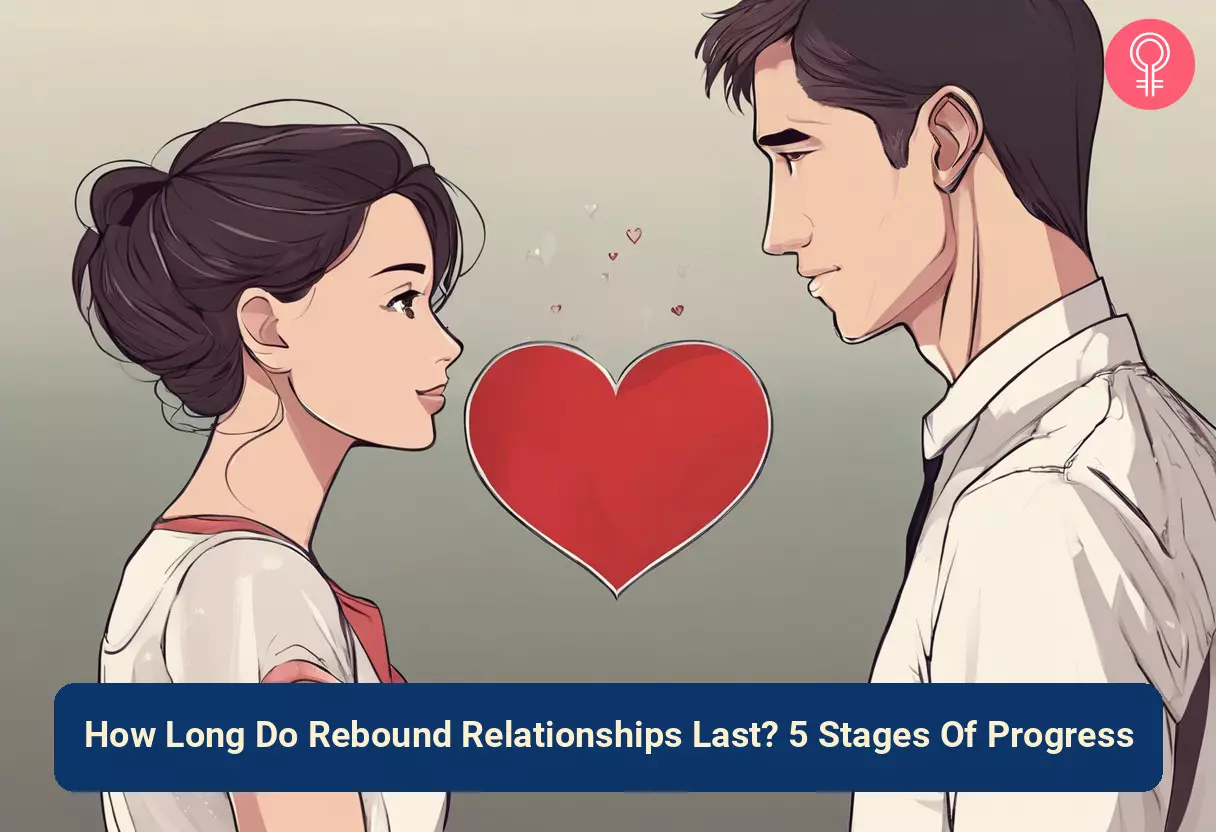How Long Do Rebound Relationships Last? 5 Stages Of Progress
Before committing to a rebound relationship permanently, examine and assess the pros and cons.

Image: Shutterstock
Not everyone reacts the same way or follows the same path after a painful breakup. It is not easy to deal with the situation, and you may decide to get into a rebound relationship with another person to seek some comfort. But how long do rebound relationships last? Most people put themselves into such a relationship to meet their emotional needs, to deal with their loneliness, or to get distracted from their past. But is it worth it?
In this article, we discuss how to identify a rebound relationship, how it progresses, and certain issues with rebound relationships that you must be wary about. Keep reading.
In This Article
Identifying A Rebound Relationship

A rebounding partner can cause a lot of emotional damage, putting your well-being and mental health at stake. The trauma of a rebounding relationship can leave you hollow, hopeless, and broken. On the other hand, your partner might remain unscathed and unbothered.
Rosemary, a blogger, shares her experiences of being a rebound to other people. She writes from experience that it leads to a lot of hurt, noting, “I hope you are in it for all those reasons; the fun, and the sex and the terrible dietary choices because if you are in it for their heart, you are going to get burned (i).”
Here are some signs to look out for to understand if you are someone’s rebound:
1. Last Breakup
Knowing how much time has passed since your partner’s last breakup or relationship can be an indicator in determining if your relationship is based on rebound love or genuine love.
A period of grief follows the end of every relationship. People process their emotions and reflect on the good and bad that they are leaving behind. Those who experience fallouts in their relationship are emotionally vulnerable, fear being left out, and crave immediate validation. So, they find themselves rushing into another relationship as an emotional outlet for their pain.
2. The Ex Factor
A major red flag to identify a rebound relationship is that your partner is still in touch with their ex. If there has been constant communication between them, chances are your partner is trying to fill the void left by their last relationship through you and dumping their feelings on you.
3. Reminiscing The Past
If you find out that your partner finds ways to trace back everything to their previous relationship by bringing up their ex in most conversations, it is safe to say that they are rebounding. It is quite normal if they talk about the ex in a conversation initiated by you, but anything more than that is not a good sign.
 Quick Tip
Quick Tip4. Commitment Phobia
Rebounders in a relationship are intense with their passion and shower overwhelming love over their partner but chicken out on commitments. Although they are quick enough to form a connection full of feelings, emotions, and togetherness, they have an insecure attachment style and tend to run away from committing to something. So, if it is difficult to get them to commit to you, it is a case of rebounding.
5. All They Do Is Jump
A clear sign of rebounding is when a person is jumping from one relationship to another and feels the need to stay invested in some relationship at a given time.
6. Mixed Signals
Clear communication is effective, but this art is not mastered by all – and definitely not by a rebounding partner. They give out mixed signals. A relationship with them would feel passionate and love-filled one day, and the next day, it would be ignorance and rejection.
People with rebounding tendencies are conflicted by their own emotions and suffer due to unhealed pain. This makes it difficult for them to sustain a fulfilling relationship with anyone. Read on to know the stages that a rebound relationship goes through.
Key Takeaways
- A relationship you get into right after a breakup is called a rebound relationship.
- Usually, people get into a rebound relationship to avoid feeling lonely or make their ex jealous.
- Such relationships have a very low chance of success and may even make you overlook some major red flags.
How Such Relationships Progress

Rebound relationships are an unhealthy cycle of bouncing from one person to another to heal unhealed wounds. They are an attempt to erase the memories of past relationships and exes by seeking love and affection from other people. Such relationships result in hurting the other party as they are short-lived and hollow.
Here are the five stages every rebound relationship goes through:
1. Short-Lived Passion
The end of a long-term relationship leaves rebounders looking for attraction, love, and comfort. They are not looking for a genuine connection but a distraction to forget the past. Rebounders accommodate anyone who is on their way in the rush to forget their exes. Once they find someone, they put the new person on a pedestal to adore, love, and carve them into a perfect partner.
2. Honeymoon Avenue
A rebound relationship starts with a honeymoon phase. This stage is all about having fun and enjoying each other’s company. During this phase, the rebounder showers endless love and attention on the new partner. They try to speed up the natural progression of the relationship and become emotionally invested in a short duration.
3. Trouble In Paradise

It does not take long for a rebound relationship to meet the fate of a sinking ship. The rebounder starts comparing their current partner to their ex. Toxic arguments and conflicts ensue. Rebounders tend to lean towards their ex-partners every time their current partner causes even a minor inconvenience. The mind of a rebounder wanders around their ex as they believe them to be their safe haven, further repelling them from their current relationship.
Paz Goldman, who is a relationship coach and Youtuber, shares his personal experience of being in a rebound relationship as a reboundee in one of his videos. He states, “About 4 months in, she hit the fan. Of course, she didn’t have any relationship skills to solve it, I didn’t have the relationship skills to solve it as well and then the relationship just went on and on with not really good communication (ii).”
4. Instant Regret
Due to direct comparisons, disappointments, and conflicts, the rebounder feels instant regret and sadness for getting into the new relationship. At this stage, they are fully aware that this relationship is heading to splitsville. As more conflicts arise, the rebounder eventually loses feelings for their partner. The end of this relationship, too, makes them feel emotionally wounded. So, to heal this wound, they again go out to seek love and comfort from other people.
5. Jump Ships
In search of this new love and comfort, the rebounder would either abandon their current relationship and jump onto another or try to make amends with their ex-lover. More often than not, they try with all their might to ignite some sparks of love to seek the attention and love of a new prospective partner. And the cycle of hollow rebound relationships continues.
It is thus evident that throwing oneself into a new relationship, with baggage from the past, is not the best option to escape grief and hurt. Let’s look into other reasons why rebound relationships are probably not a great idea.
Issues With Rebound Relationships

Rebound relationships are characterized by sadness, heartbreak, emotional suffering, and regret. Hence, it is very important to recognize the problems that accompany such relationships and take back the control of your life.
Here are a few reasons why a rebound relationship can be problematic:
- Avoids Healing
Rebound relationships can be a source of unhealed trauma and grief. An individual who has walked out of a relationship is hurt, shocked, and negatively affected by this experience. Not resolving your inner conflicts, neglecting your deeper issues, and not working on your behavior point at another failed relationship (the one with yourself), leaving your heart more vulnerable and hurt.
Distracting yourself from your pain will not let you heal and grow. Rebound relationships keep the cycle of unhealed trauma alive, which prevents personal development and emotional growth. This is because people often use new relationships to mask their psychological wounds, and they get caught in a cycle that never really heals them, causing tension and conflicts in the next relationship. It will only add to your pain and emotional baggage as you tend to repeat the cycle of hurt by hurting other people’s feelings. Taking the road of healing is crucial, as it enables an individual to take new romantic adventures in life with clarity and purpose and be ready to connect genuinely.
 Quick Tip
Quick Tip- Makes You Overlook Red Flags
Avoiding the healing process blinds you from seeing the faults and possible red flags in other people. Patience is not a virtue when it comes to forming connections based on rebounds. People who find themselves in rebound relationships usually feel their relationship has progressed quickly in a short period. Ideally, building the foundation of a healthy relationship and knowing a person takes time and effort; rushing this process will only lead to heartbreak.
- Not Ready
It is tough to forget and move on from someone you once held close to your heart. The time, effort, and energy you invested keep you anchored to the relationship. Rebounds do not usually blossom into a happy relationship as you still think and reminisce over your ex.
Taking time to introspect after a negative event like falling out of love is crucial. Inner reflections help you understand what expectations you hold from yourself, how you plan to go about the emotional healing process, and if you are ready to make another commitment of love.
Here are a few signs that you are still in the process of healing and not ready for love:
- You have hopes of your ex-partner getting back with you.
- The urge to talk to them or look them up on social media persists.
- You use love connections as a coping mechanism for loneliness.
- You struggle to articulate your purpose of being in a relationship.
- The concept of relationships is hazy; you have an infatuation with low interests and no common grounds.
- Low Chance Of Success
The chances of a rebound relationship working out are scarce, though it differs individually. Rebound relationships usually end in a matter of a few months, usually for the following reasons:
- You are an inch closer to causing your heart more damage.
- The motivation behind rebound relationships could be resentment.
- It is just a distraction from your last relationship or heartbreak.
- It is an illusion in the name of thrill.
There are multiple reasons why you shouldn’t get into a rebound relationship. However, some people do find solace in the arms of a new lover while getting over a past relationship. Read on to understand how such relationships can help you move on for good.
Pros Of A Rebound Relationship

Everything has its pros and cons, and rebound relationships are no exception to this rule. Here are some positive takeaways you can expect after getting involved in a rebound relationship:
- A rebound can be a good way of shifting your focus from the past to the present.
- It helps you explore and meet different kinds of people.
- It makes it easier to cut ties with your ex-partner. Research indicates that for individuals with an anxious attachment style, redirecting their focus on someone new and getting into a rebound relationship can be beneficial in the breakup recovery process (1).
- Such a relationship pulls you out of your comfort zone, helping you grow.
- Your self-esteem gets a boost with all the attention you attract from the new partner.
- It helps kill feelings of loneliness and adds adventure to your life.
Yes, it may be an effective way to forget your ex and move on. However, despite being so thrilling at the beginning, a rebound relationship may not last for very long. There are a few common signs that indicate that the end of your rebound connection is near. Check them out in the next section
Signs Of A Rebound Relationship Ending
- Your emotions may not run as deep as you sense a lack of emotional intimacy.
- Your partner frequently compares you to their ex. It’s a sign they might not be fully over their past relationship.
- You feel like you are rushing the relationship.
- Old relationship problems or unresolved issues begin to resurface and strain your relationship.
- Your partner may experience intense mood swings as they grapple with unresolved emotions.
- Your partner suddenly expresses a strong desire for closure with their ex. This could signal the end of your rebound relationship.
If you are struggling to understand the dynamics of the relationship, take a look at the next section on how to navigate these turbulent waters.
Rebound relationships are common in the dating world. They often turn up shortly after a big breakup. It is imperative to understand rebound relationships, especially for those who want to move forward. Here are some things that one needs to bear in mind while navigating rebound relationships,
- You should realize why you are getting into this rebound relationship. Are you trying to distract yourself, seek validation, or connect for real? This will give you a hint as to whether you are ready for another relationship or you are running away from old pain.
- Most importantly, reflect on your emotional state before engaging with another person. Are you healed from the previous relationship?
- Communicate clearly to your rebound partner what you really want from them. Do not promise them something you are not willing to give if you are not ready for anything serious. Otherwise, it will end up hurting the other person or the relationship in the long run.
- Another important thing to do in rebound relationships is to set boundaries. This will help the two parties understand one another.
- Comparison with your ex is not okay because it can create tension that may prevent you from building a new relationship.
- Avoid being overly attached, and let your relationship unfold naturally. In time, you will understand your feelings and your partner’s feelings better.
- Self-reflection can help you realize if the relationship is helpful or is time to move on.
- If you feel that your rebound relationship causes you more pain than joy, or if you still have strong feelings for your ex, then you might have to reconsider your decision.
Rebound relationships need a balance of self-awareness, communication, and emotional intelligence. If you understand your motive and set clear boundaries, you will be fostering a relationship that leads you to healing instead. Rebound relationships are to be dealt with caution and clarity.
Infographic: 6 Signs You Are In A Rebound Relationship
Breakups can be painful and how each of us deal with them is different. Some people take some time apart to heal, while others seek solace in others. But how do you know whether the emotions you share with that person is love or rebound? Check out this infographic to know more!

Illustration: StyleCraze Design Team
Dealing with a painful breakup is not easy. Some of us may choose to go into a rebound relationship to deal with loneliness and distract ourselves from the past. How long do rebound relationships last and what are the pros and cons of getting into one? Lack of commitment and reminiscing about their past are a few signs that you are in a rebound relationship with someone. While rebounds can make you shift your attention from the past, they can also prevent healing. It is recommended that you take some time to heal before you get into a relationship with someone else.
Frequently Asked Questions
Can rebound relationships last for years?
Rebound relationships, in most cases, last from a few months to a year. They usually don’t last in the long term because the rebounding partner has not moved on from their previous partner. In rare cases, they may last for years. The longevity of a relationship depends on the understanding between the partners.
Do rebound relationships move fast?
Yes, rebound relationships move fast and typically don’t last long. They tend to end quickly as they are not built on a solid foundation.
Do rebounds help you move on?
Yes, rebounds may help in moving on. Research says that people who get into a rebound relationship move and heal quicker than people who deal with their heartbreak in loneliness (2 ).
Illustration: How Long Do Rebound Relationships Last? 5 Stages Of Progress

Image: Stable Diffusion/StyleCraze Design Team
Rebound relationships can be short-lived, but exactly how long do they last? Find out this and more in the video below. Play now!
Personal Experience: Source
StyleCraze's articles are interwoven with authentic personal narratives that provide depth and resonance to our content. Below are the sources of the personal accounts referenced in this article.
i. The Problem with Reboundshttps://myunintentionallife.blogspot.com/p/being-rebound.html
ii. REBOUNDEE Shares His Painful Personal Story and Experience Of Being In a Rebound Relationship
https://youtu.be/90dGYfnv2IM?si=Xx9ycCaecbpAp1rq
References
Articles on StyleCraze are backed by verified information from peer-reviewed and academic research papers, reputed organizations, research institutions, and medical associations to ensure accuracy and relevance. Read our editorial policy to learn more.
Articles on StyleCraze are backed by verified information from peer-reviewed and academic research papers, reputed organizations, research institutions, and medical associations to ensure accuracy and relevance. Read our editorial policy to learn more.
- On the rebound: focusing on someone new helps anxiously attached individuals let go of ex-partners
https://pubmed.ncbi.nlm.nih.gov/19625631/ - Too fast, too soon? An empirical investigation into rebound relationships
https://journals.sagepub.com/doi/full/10.1177/0265407514525086
Read full bio of Ellen J.W. Gigliotti
Read full bio of Sneha Tete
Read full bio of Shatabdi Bhattacharya
Read full bio of Reshma Latif



























Community Experiences
Join the conversation and become a part of our empowering community! Share your stories, experiences, and insights to connect with other beauty, lifestyle, and health enthusiasts.